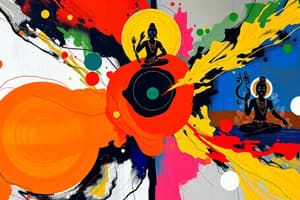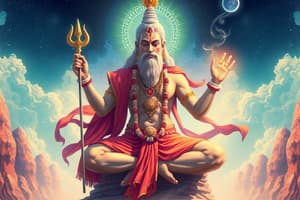Podcast
Questions and Answers
What does the Vedanta tradition primarily focus on?
What does the Vedanta tradition primarily focus on?
- The nature of reality and the self (correct)
- Understanding the physical body
- Extreme religious beliefs
- The development of magical skills
What is logotherapy primarily concerned with?
What is logotherapy primarily concerned with?
- Religious doctrine and beliefs
- Physical healing through medicine
- Healing through meaning and purpose (correct)
- Psychological manipulation techniques
According to the Vedanta tradition, what is considered to be the ultimate goal of life?
According to the Vedanta tradition, what is considered to be the ultimate goal of life?
- Attaining social recognition
- Conforming to societal norms
- Achieving wealth and success
- Realizing one's true identity as part of universal consciousness (correct)
What does the term 'cult' refer to?
What does the term 'cult' refer to?
What aspect of human motivation does Viktor Frankl emphasize in his theory?
What aspect of human motivation does Viktor Frankl emphasize in his theory?
What characterizes the Spiritual Self according to the Vedanta tradition?
What characterizes the Spiritual Self according to the Vedanta tradition?
What belief is commonly associated with magic?
What belief is commonly associated with magic?
Which practice is associated with focusing on magical skills and rituals?
Which practice is associated with focusing on magical skills and rituals?
What does the Sanskrit word 'Atman' refer to?
What does the Sanskrit word 'Atman' refer to?
Which component of the Triangular Theory of Love represents feelings of closeness?
Which component of the Triangular Theory of Love represents feelings of closeness?
In the context of spirituality, what typically drives individuals to seek meaning in life?
In the context of spirituality, what typically drives individuals to seek meaning in life?
What best describes rituals in a religious context?
What best describes rituals in a religious context?
Which aspect distinguishes the Atman from the body and mind?
Which aspect distinguishes the Atman from the body and mind?
What question might one explore in the search for life's meaning from a spiritual perspective?
What question might one explore in the search for life's meaning from a spiritual perspective?
In Sternberg's Triangular Theory of Love, what does the component 'Decision/Commitment' entail?
In Sternberg's Triangular Theory of Love, what does the component 'Decision/Commitment' entail?
Which of the following characteristics does NOT describe spirituality as outlined above?
Which of the following characteristics does NOT describe spirituality as outlined above?
What is the concept of Buddha-nature translated as?
What is the concept of Buddha-nature translated as?
According to logotherapy, which of the following is NOT a way to discover meaning in life?
According to logotherapy, which of the following is NOT a way to discover meaning in life?
Which assumption of logotherapy emphasizes the idea that humans have a will to meaning?
Which assumption of logotherapy emphasizes the idea that humans have a will to meaning?
What does the aesthetic self refer to in the context of human nature?
What does the aesthetic self refer to in the context of human nature?
Which of the following combinations plays an important role in shaping the physical self?
Which of the following combinations plays an important role in shaping the physical self?
What is a negative effect of materialism on mental health?
What is a negative effect of materialism on mental health?
Which of the following is NOT a characteristic of a materialistic person?
Which of the following is NOT a characteristic of a materialistic person?
What are intrinsic life goals primarily associated with?
What are intrinsic life goals primarily associated with?
Which of the following practices is associated with minimalism?
Which of the following practices is associated with minimalism?
Which factor is NOT considered to affect physical growth and development?
Which factor is NOT considered to affect physical growth and development?
In the context of materialism, what does 'utility' refer to?
In the context of materialism, what does 'utility' refer to?
How can self-esteem be developed effectively?
How can self-esteem be developed effectively?
What aspect of physical self-image is shaped primarily by external influences?
What aspect of physical self-image is shaped primarily by external influences?
What is the primary belief of Taoism regarding the self?
What is the primary belief of Taoism regarding the self?
What does the law of Karma imply in Hinduism?
What does the law of Karma imply in Hinduism?
Which term describes the process by which Hindus believe Atman is reincarnated until it achieves Nirvana?
Which term describes the process by which Hindus believe Atman is reincarnated until it achieves Nirvana?
According to William James, what primarily constitutes the material self?
According to William James, what primarily constitutes the material self?
What does the term 'Nirvana' signify in the context of Hinduism?
What does the term 'Nirvana' signify in the context of Hinduism?
Which component is NOT part of the five parts that compose the individual in the context provided?
Which component is NOT part of the five parts that compose the individual in the context provided?
What is the root meaning of the word 'Buddhism'?
What is the root meaning of the word 'Buddhism'?
Which orientation emphasizes the ownership of money and possessions for happiness and social progress?
Which orientation emphasizes the ownership of money and possessions for happiness and social progress?
Flashcards are hidden until you start studying
Study Notes
Atman and the Self
- Atman refers to the "essence, breath, or soul" in Sanskrit
- The concept emphasizes knowing yourself (Atman = "Know thyself")
- The body, mind, and ego are not the true Self, but the soul
- Suggests a "true self" distinct from our physical, emotional, and psychological selves
Soul
- The immaterial aspect or essence of a human being
- Confers individuality and humanity
- Often considered synonymous with the mind or self
- The part of the individual that partakes of divinity and often is thought to survive the death of the body
Spirituality
- A sense of connection to something larger than ourselves
- Often involves a search for meaning in life
- Connected to big questions about life and identity, such as:
- Am I a good person?
- What is the meaning of my suffering?
Rituals
- Religious ceremonies consisting of a series of actions performed according to a prescribed order
- Performed to work with and on behalf of the community and the self
- Considered sacred language
Ceremonies
- Express feelings and beliefs beyond the limitations of speech
- Can be elaborate or simple
- Also considered an act of courtesy
Religion
- An organized system of ideas about the spiritual sphere that people use to interpret aspects of the universe beyond their control
Vedanta Tradition
- One of the traditions in Hindu philosophy
- Focuses on the nature of reality, the self, and the universe
- Teaches that the ultimate goal of life is to realize one's true identity as part of the universal consciousness
- Believes that the Spiritual Self is a non-violent, stable, eternal, and differentiated identity from your body, mind, and feelings
Spiritual Self
- Is a non-violent, stable, eternal identity distinct from the body, mind, and feelings
- A hidden potential for growth and awakening that exists in all beings
True Self
- Believed to be real, permanent, and already present in every unenlightened individual
Cult
- A social group defined by their unusual religious, spiritual, and philosophical beliefs, often centered around a charismatic leader or an ideology
Magic
- Mythic force believed to protect an individual from evil
Witchcraft
- Practice believed to focus on magical skills, spells, incantations, and magical rituals
Viktor Frankl
- Developed logotherapy (healing through meaning)
- Proposed that humans are motivated by a "will to meaning"
- Believed that life has meaning in all circumstances
- Emphasized freedom of choice and personal responsibility
- Emphasized that we can find meaning in life by:
- Creating a work or doing a deed
- Experiencing something or encountering someone
- By the attitude we take toward unavoidable circumstances
Six Basic Assumptions of Logotherapy
- Body, mind, and spirit
- Life has meaning in all circumstances
- Humans have a will to meaning
- Freedom to find meaning
- Meaning of the moment
- Individuals are unique
Hinduism
- The religion of ancient people known as the Aryans
- Includes the concept of karma, an important doctrine
- Karma is the idea that everything you do in your past will eventually come back to you
- Hindus believe the Atman is immortal and continually reincarnated until it reaches a state of Nirvana (non-birth)
Law of Karma
- States that the influence of karma extends through the reincarnation of the soul
Buddhism
- Comes from the root word "budh," meaning awake
- Siddhartha Gautama, also known as the Buddha, is its founder
- The ultimate goal of Buddhism is enlightenment
- Buddha nature refers to the "true self," hidden inside all beings, and capable of blossoming
- Buddha nature is understood to be a universal nature
The Five Parts of the Individual:
- Matter
- Sensation
- Perception
- Mental Constructs
- Depression
Material Self
- The sum total of all that one can call their own
- Composed of one's body, valued possessions, and loved ones
- People often identify themselves most clearly in terms of their material possessions
- Materialism often leads to an orientation that emphasizes ownership of money and possessions for happiness and social progress
Effects of Material Possessions
- Can be used as status symbols
- People use them to measure success
- Can motivate people to work harder
- Loss of material possessions can be disruptive to mental health
- Materialism (excessive desire for material things) can lead to a focus on material things for happiness and social progress.
Materialistic Person
- Someone with a high level of materialism
- Excessively concerned with the acquisition of material possessions
- May be considered a shopaholic
Reducing Materialism
- Setting intrinsic life goals: focus on internal values and personal growth
- Minimalism: a response to the mass consumer culture, focused on living with less
- Utility, simplicity, and financial capacity:
- Utility: buying only what is truly useful
- Simplicity: resisting the urge to buy more than you need
- Financial Capacity: living within your means
Physical Self
- Shaped by genetics and influences body image, self-esteem, and cultural perceptions
- Appearance matters, but true beauty includes inner qualities like kindness and confidence
Two Factors Affecting Physical Growth and Development
- Heredity (biological inheritance from parents)
- Environment includes learning, experiences, and factors such as diet, nutrition, and disease.
How Can Self-Esteem Be Developed?
- Acceptance: lies in the concept of the Buddha-nature
- Finding meaning: Logotherapy proposes that meaning in life can be discovered in three ways
- Creating a work or doing a deed
- Experiencing something or encountering someone
- By the attitude we take toward unavoidable circumstances
Aesthetic Self
- Human nature is drawn to beautiful things
Physiognomy
- Judging a person based on facial expression
Morphopsychology
- Judging a person based on structure
Heredity & Environment
- Play an important role in the physical self
Taoism
- An ancient tradition of philosophy and religious belief attributed to Lao Tzu
- Believes the self is an extension of the cosmos, not of social relationships
- Describes the self as one of the limitless forms of the Tao
Ma'am Jasmine
- An individual referenced in the text
- Her statements highlight the importance of heredity and environment on the physical self
Studying That Suits You
Use AI to generate personalized quizzes and flashcards to suit your learning preferences.




